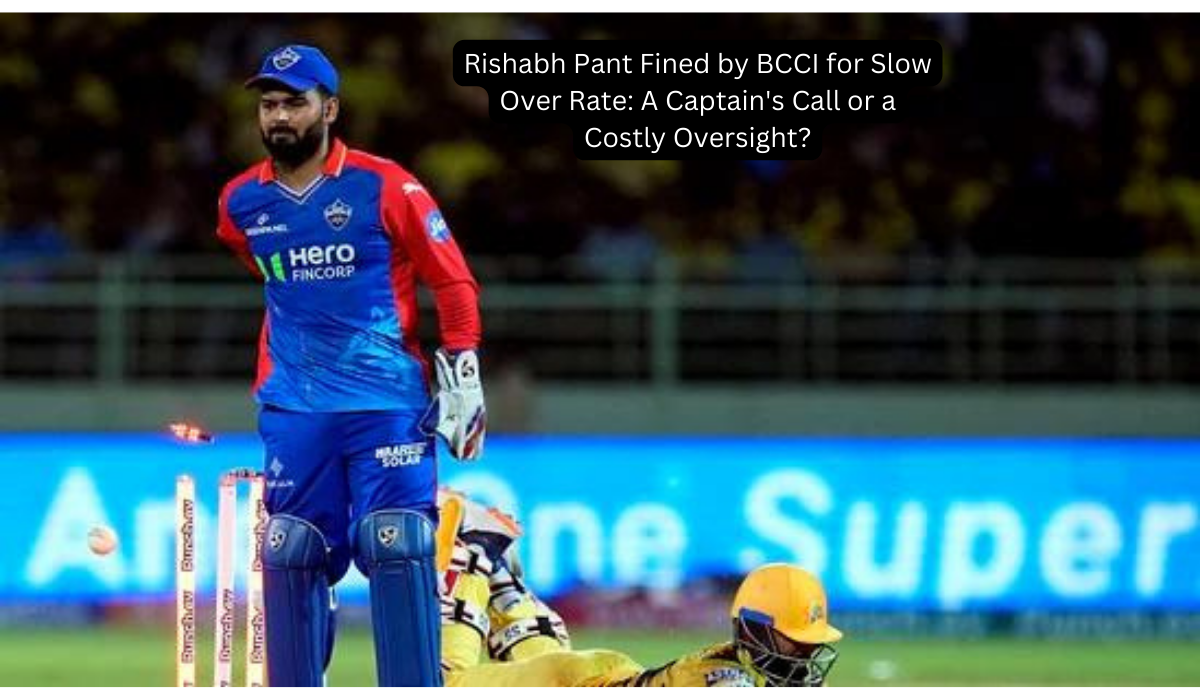Rishabh Pant, the swashbuckling wicketkeeper-batsman and captain of the Delhi Capitals (DC), recently found himself on the wrong side of the Board of Control for Cricket in India (BCCI) for a seemingly minor offense – slow over rate. Imagine the surprise: the aggressive young leader known for his quick decisions facing a fine for his team’s sluggish pace during an IPL match.
This incident sparked discussions among cricket fans. Was it a fair call by the BCCI, or an overreaction? Let’s delve deeper into the details, analyze the implications, and explore the perspectives surrounding this event.
Why Did the BCCI Fine Rishabh Pant?
The incident occurred during the 17th season of the Indian Premier League (IPL). During DC’s match against the Chennai Super Kings (CSK), Pant’s team fell behind the stipulated over rate, resulting in a fine of INR 12 lakh (approximately USD 15,000) for the skipper.
Slow over rate disrupts the flow of the game and shortens valuable playing time, impacting both viewers and broadcasters. The BCCI has a strict policy in place to ensure a smooth pace of play, and captains are held accountable for their team’s adherence to these regulations.
Here’s a breakdown of the situation:
- Match: Delhi Capitals vs. Chennai Super Kings (IPL 2024)
- Offense: Slow over rate by Delhi Capitals
- Penalty: INR 12 lakh fine for Rishabh Pant (DC captain)
Captain’s Conundrum: Balancing Strategy and Regulations
Leading a cricket team, especially in a high-pressure environment like the IPL, is no easy feat. Captains have to make crucial decisions on the field, often under immense time constraints. Imagine juggling bowling changes, field placements, and batting strategies all while keeping an eye on the clock.
In this instance, Pant might have prioritized strategic discussions with his bowlers or tactical changes during crucial phases of the game, unintentionally causing the over rate to slip. This raises the question – should strategic decisions take precedence over maintaining the over rate, or can a balance be achieved?
The BCCI’s Perspective: Maintaining Order and Setting Precedents
The BCCI, as the governing body of cricket in India, has the responsibility to ensure fair play and maintain order in the IPL. Slow over rates can disrupt the game’s entertainment value and negatively impact broadcasters who rely on a predetermined schedule. Imagine millions of fans tuning in to watch a thrilling IPL match, only to see it drag on due to a slow over rate.
By penalizing Pant, the BCCI sends a strong message to all IPL captains. It emphasizes the importance of adhering to over rate regulations and highlights the consequences of failing to do so. This sets a precedent for future matches, encouraging captains to be more mindful of maintaining a steady pace of play.
Beyond the Fine: Was it a Missed Captaincy Lesson?
While the fine itself might seem like a minor setback, the incident could be a valuable learning experience for Pant as a young captain. It highlights the importance of time management and the need to strike a balance between strategy and adherence to regulations.
Moving forward, Pant can develop strategies to ensure his team maintains a healthy over rate without compromising on their gameplay. This could involve delegating tasks, using timeouts more effectively, and fostering a team culture that prioritizes playing within the stipulated time frame.
Conclusion: A Learning Curve for Pant and a Reminder for All
The BCCI’s decision to fine Rishabh Pant for slow over rate sparked discussions and highlighted the complexities of captaincy in the fast-paced world of the IPL. While some may view it as a harsh penalty, it serves as a reminder for all captains to prioritize maintaining a steady pace of play.
For Pant, this incident can be a valuable learning experience. It can help him develop his leadership skills, learn to manage time more effectively, and ensure his team performs at its peak while adhering to the rules. The cricketing world will be watching to see how Pant responds to this situation and whether he emerges as a more well-rounded leader in the seasons to come.
BCCI Fines Rishabh Pant: Frequently Asked Questions
Here are 5 unique FAQs to quench your curiosity about the BCCI’s decision:
1. Has this happened to other captains in the IPL?
Yes, slow over rate is a recurring offense in the IPL, and captains have been fined on numerous occasions. The BCCI enforces a consistent policy for all teams, penalizing them for exceeding the stipulated time limit. This ensures fairness in the league and discourages captains from intentionally slowing down the game’s pace to gain a strategic advantage. In previous seasons, captains like Virat Kohli and Rohit Sharma have also faced fines for slow over rates by their respective teams.
2. What are some strategies captains can use to maintain a good over rate?
Captains can employ various strategies to ensure their team maintains a healthy over rate without compromising on gameplay. Here are a few examples:
- Delegation: Captains can delegate tasks like bowler consultations and field adjustments to other team members, allowing them to focus on keeping an eye on the clock.
- Timeouts: Utilizing strategic timeouts effectively can provide a window to discuss strategies without impacting the over rate. Captains can use these brief breaks to address specific needs without significantly disrupting the game’s flow.
- Communication: Clear communication with bowlers and fielders is crucial. Captains can pre-plan bowling changes and field placements to minimize delays during the match. Additionally, reminding bowlers to bowl at a brisk pace can help maintain the over rate.
- Team Culture: Fostering a team culture that prioritizes playing within the stipulated time frame is essential. Captains can lead by example and emphasize the importance of adhering to the over rate regulations.
3. How does the BCCI calculate the fine amount for slow over rate?
The BCCI has a defined penalty structure based on the severity of the over rate offense. The amount is typically a percentage of the match fee for the captain and can vary depending on the number of overs short of the stipulated rate.
4. Does a slow over rate affect the final outcome of the match?
While a slow over rate doesn’t directly affect the final score, it can impact the game’s flow and viewing experience. Reduced playing time can limit strategic opportunities for both teams, potentially affecting the match’s overall outcome. Additionally, viewers might miss crucial moments of the game due to time constraints caused by a slow over rate.
5. What are the potential consequences of repeated slow over rate offenses?
While a one-time offense usually results in a fine, repeated slow over rate violations by a team can lead to stricter penalties. The BCCI might impose harsher fines, point deductions, or even suspension of players or captains for persistent disregard for the over rate regulations.

